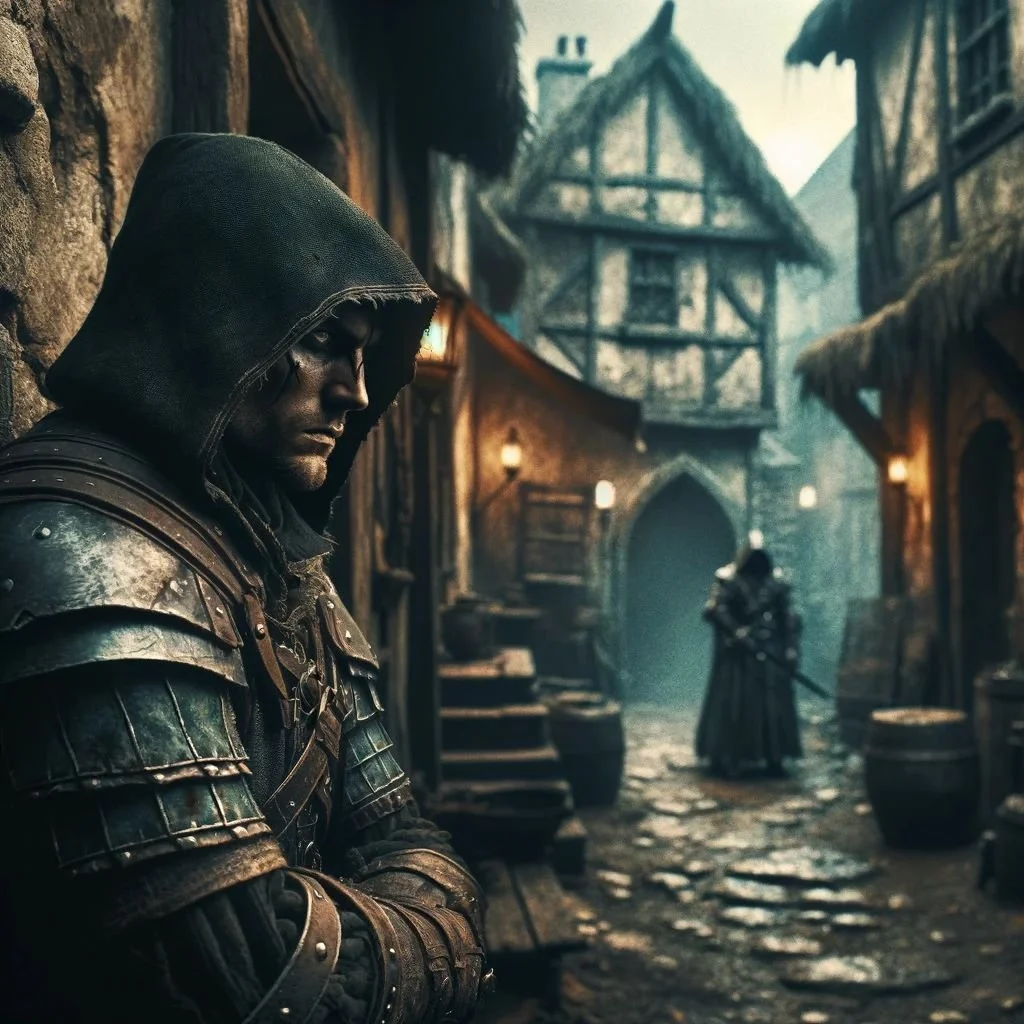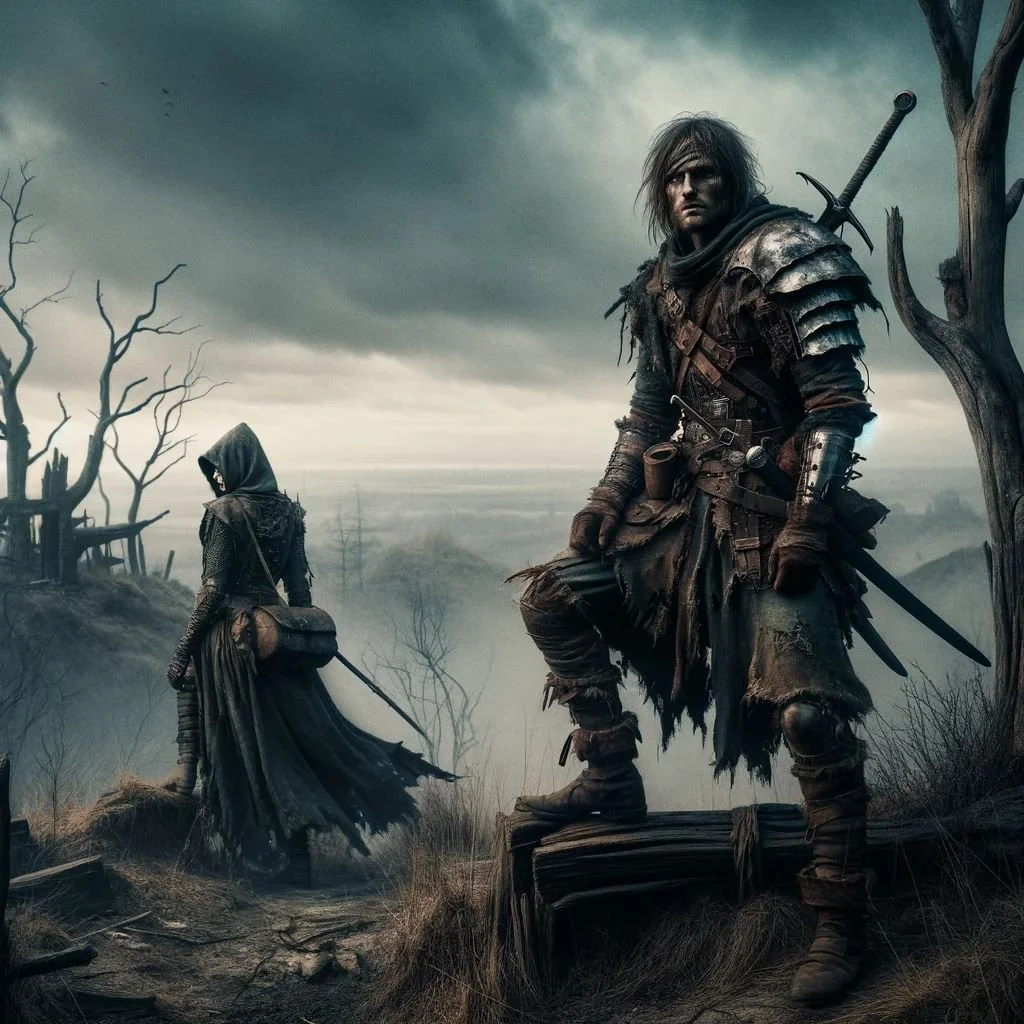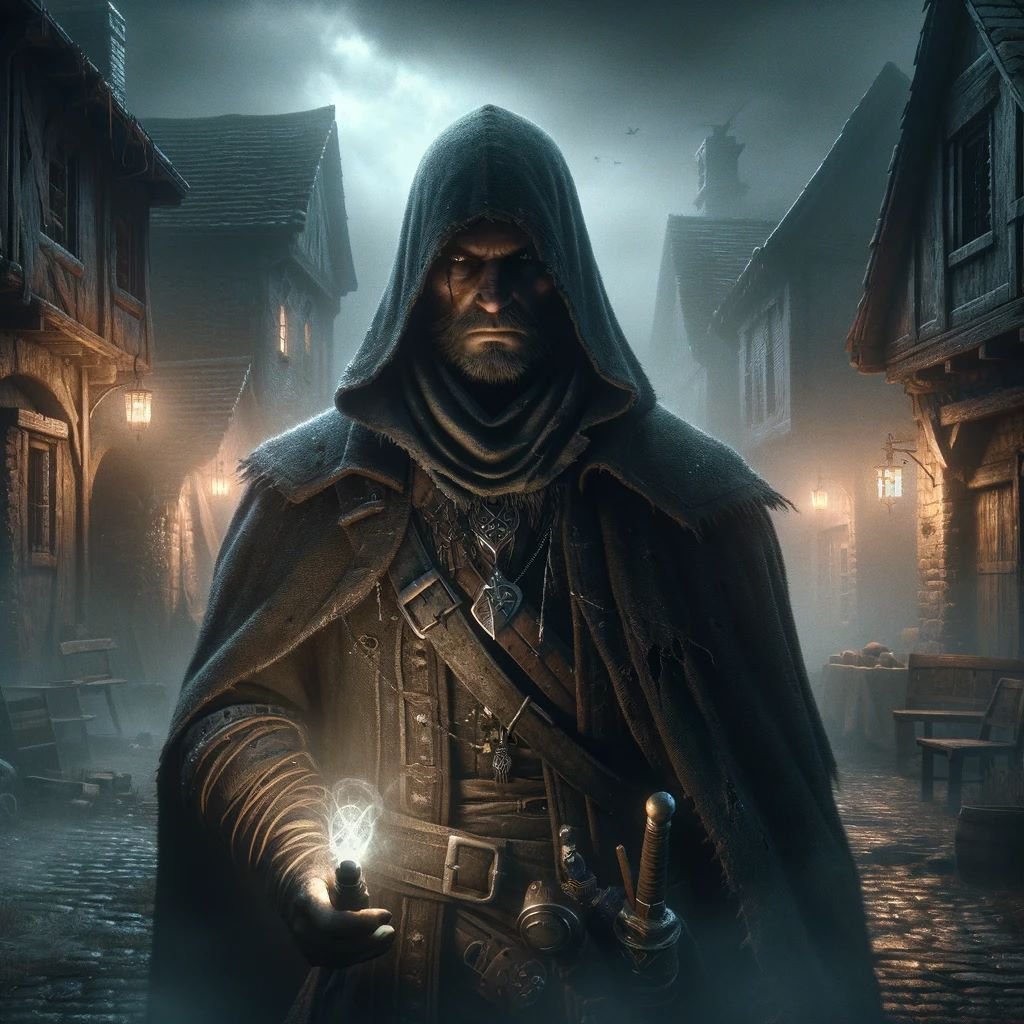Within the intricate weave of low fantasy, a genre revered for its grounded world-building and subtle magical elements, emerges a distinct and compelling protagonist: the anti-hero. Eschewing the archetypal paradigms of valiant knights and malevolent overlords typical of high fantasy, low fantasy’s anti-heroes present a more nuanced and reflective portrayal of the human psyche. They are characters etched with flaws, often driven by complex motivations and a moral compass that defies conventional categorization, mirroring the intricate and sometimes murky nature of real-life human behavior.
In our journey, ‘Anti-Heroes in Low Fantasy,’ we venture into the dimly lit corners where these intriguing figures lurk, unraveling the essence of their existence. We explore the multifaceted roles they play within their worlds, their often conflicted motivations, and how their presence enriches the narrative tapestry of the genre. This exploration is not just an examination of character archetypes; it’s an insight into how anti-heroes captivate our imagination, challenge our moral preconceptions, and why they hold a significant place in the realm of low fantasy.
Join us as we traverse the morally ambiguous paths walked by these anti-heroes. Discover how they redefine heroism, bring depth to their narratives, and why their compelling allure makes them an indispensable fixture in the realm of low fantasy storytelling. As we delve into their world, we uncover not just the stories they inhabit but also the profound impact they have on the genre’s narrative appeal and the broader cultural fascination with complex characters.
Defining the Anti-Hero
Beyond Black and White: The Moral Complexity of Anti-Heroes
Anti-heroes are compelling figures in storytelling, standing in stark contrast to the archetypal hero and villain dichotomy. These characters exist in a moral gray area, blending heroic traits with less savory aspects. By challenging the conventional notions of good and evil, anti-heroes create a multifaceted character profile that defies simplistic categorization. Their actions and motivations are often a mix of self-interest and, at times, a skewed sense of justice or morality, making them unpredictable and intriguing.
Characteristics and Appeal: The Humanization of Flawed Figures
Anti-heroes are typically characterized by a complex set of traits that make them both admirable and reproachable. They often display qualities such as moral ambiguity, flawed personal ethics, and a troubled past that provides context, though not necessarily justification, for their actions. This complexity is what draws readers and viewers to anti-heroes. They represent a more realistic and relatable reflection of human nature, where virtues and vices coexist. Unlike traditional heroes, anti-heroes are not paragons of virtue; they are imperfect beings navigating a flawed world, much like the audience themselves.
The Nuances of the Anti-Hero
The Spectrum of Anti-Heroism
The anti-hero archetype spans a wide spectrum, from characters who are more heroic but with notable flaws to those who lean closer to villainy yet retain some redeeming qualities. This spectrum allows for a diverse range of characters and narratives, each exploring different aspects of morality and personal ethics. Some anti-heroes may strive for good with questionable methods, while others might pursue selfish goals with moments of unexpected benevolence.
The Backstory: Understanding the Anti-Hero
Many anti-heroes are shaped by a complex backstory that sheds light on their current worldview and actions. Traumatic events, societal injustices, or personal failures often play a significant role in their narrative, offering insights into their motivations. Understanding an anti-hero’s past is crucial for the audience to form a nuanced view of the character, recognizing the factors that contribute to their morally ambiguous nature.
The Role of Anti-Heroes in Storytelling
Challenging Traditional Narratives
Anti-heroes play a vital role in modern storytelling by challenging traditional narratives and expectations. They push the boundaries of what a protagonist can be, offering stories that are rich in moral and psychological complexity. Through the journey of an anti-hero, narratives can explore themes of redemption, corruption, identity, and the nature of good and evil in more depth and with greater nuance.
Reflecting Societal Complexities
Anti-heroes often reflect the complexities and ambiguities of the society they inhabit. They resonate with audiences because they mirror the real-world struggles between personal desires, ethical dilemmas, and societal expectations. In presenting characters that navigate these challenges in morally ambiguous ways, anti-heroes encourage reflection and discussion about the nature of morality, ethics, and the human condition.
Embracing the Shadows with the Anti-Hero
The anti-hero archetype offers a profound exploration of character and morality in storytelling. By existing in the gray areas between heroism and villainy, anti-heroes provide a multifaceted and realistic portrayal of human nature and its complexities. They challenge audiences to reconsider their perceptions of right and wrong, good and evil, and in doing so, anti-heroes enrich narratives with depth, relatability, and a touch of the unexpected. As we continue to delve into the stories of these compelling characters, the anti-hero remains a captivating and essential figure in the landscape of modern storytelling.
Anti-Heroes in Low Fantasy: A Perfect Fit
Mimicking the Real World: Complex Characters in a Complex Setting
Low fantasy, with its subtle infusion of the supernatural into a world that closely resembles our own, provides the perfect backdrop for the nuanced portrayal of anti-heroes. These characters, much like the individuals we encounter in real life, are replete with complexities and moral ambiguities. They reflect the multifaceted nature of humanity, where good and bad coexist and moral clarity is often elusive. In low fantasy, the anti-hero’s journey and internal conflict mirror the real-world struggles we all face, making them profoundly relatable and compelling.
Complex Narratives: A Fertile Ground for Moral Ambiguity
The morally complex narratives of low fantasy offer fertile ground for anti-heroes to thrive. In these stories, the distinction between right and wrong is often murky, and decisions come with significant, realistic consequences. This complexity allows anti-heroes to navigate a world where their flawed nature can be both a hindrance and an asset, providing a rich tapestry of conflict, growth, and self-discovery. The anti-hero’s journey in low fantasy is not just about external adventures but also an exploration of their inner world and moral compass.
The Role in Storytelling
Driving Conflict and Growth: The Heart of the Narrative
Anti-heroes often stand at the heart of low fantasy narratives, driving the story’s conflict and evolution. Their personal struggles, ethical dilemmas, and complex relationships with other characters create a dynamic and unpredictable storyline. As they navigate the challenges of their world, anti-heroes often undergo significant personal growth, making their journey a compelling and central element of the narrative. Their development can provide a satisfying arc that resonates deeply with readers, offering insights into the nature of redemption, change, and the human condition.
Challenging Traditional Morality: Inviting Deeper Reflection
By operating outside the traditional boundaries of heroism, anti-heroes in low fantasy challenge readers to reevaluate their understanding of morality. These characters defy conventional moral archetypes, prompting a deeper exploration of what it means to be good or evil. Through their actions and decisions, anti-heroes invite readers to question their moral preconceptions and consider the complexities of ethical decision-making in a flawed world. This challenge to traditional morality is not just thought-provoking; it’s a crucial aspect of what makes anti-heroes so intriguing and relevant.
The Resonance of Anti-Heroes in Low Fantasy
Anti-heroes are a natural and compelling fit for the realm of low fantasy. Their complex nature and moral ambiguity resonate with the genre’s realistic settings and narratives, providing a rich and nuanced exploration of character and morality. As they navigate the morally complex landscapes of low fantasy, anti-heroes offer readers a mirror to their own world, reflecting the struggles, conflicts, and growth that define the human experience. Through their stories, we are invited to question, understand, and empathize with the shades of gray that color our world and ourselves. In the intricate dance of low fantasy storytelling, anti-heroes continue to captivate and inspire, proving that sometimes the most compelling characters are those who exist in the twilight between darkness and light.
The Cultural Impact of Anti-Heroes in Low Fantasy
A Mirror to Evolving Society: Embracing the Gray Areas
The prominence of anti-heroes in low fantasy is a clear reflection of broader societal shifts towards embracing complexity and ambiguity. As cultures move away from rigid, black-and-white thinking, there’s a growing appreciation for narratives that capture the intricacies and nuances of the human experience. Anti-heroes, with their morally ambiguous nature, resonate with modern audiences who recognize that reality is often a spectrum rather than a binary. They mirror our evolving understanding of morality, ethics, and personal identity, reflecting the contemporary world’s multifaceted nature.
Evolving Ideals: The Changing Face of Heroism
As societal values and ideals evolve, so too does the concept of what a hero is. Traditional paragons of virtue have given way to more relatable and flawed figures. Anti-heroes, with their complex motivations and often troubled pasts, align more closely with modern audiences’ understanding of humanity. They represent a significant shift from the archetypal hero, embodying the contemporary zeitgeist that values authenticity and acknowledges personal and moral complexity.
Influence Beyond Literature
Expanding Influence: Anti-Heroes in Various Media
The fascination with anti-heroes isn’t confined to the realm of low fantasy literature; it has significantly influenced other forms of media. In movies, TV shows, and video games, morally complex protagonists have become a staple. These characters offer a richer and more engaging experience, providing depth and conflict that resonate with audiences. By challenging traditional tropes and presenting more layered narratives, anti-heroes in various media reflect and reinforce the cultural shift towards embracing complexity and moral ambiguity.
Sparking Conversations: The Role of Anti-Heroes in Cultural Discourse
Anti-heroes serve as catalysts for discussion and debate, provoking audiences to engage more deeply with the narrative and its underlying themes. They challenge readers and viewers to contemplate their own values, beliefs, and biases. Through their stories, anti-heroes encourage a critical examination of societal norms, morality, and the human condition. This propensity to inspire reflection and debate makes anti-heroes not just characters in a story but significant cultural figures that contribute to ongoing conversations about ethics, psychology, and societal values.
The Enduring Legacy of Anti-Heroes in Culture
The cultural impact of anti-heroes in low fantasy and beyond is profound and enduring. These characters, with their intricate blend of virtues and flaws, reflect the complex nature of modern society and its evolving ideals. By resonating with contemporary audiences’ nuanced worldview, anti-heroes have become more than just a literary trend; they are a significant cultural phenomenon. Their influence across various media and their ability to provoke thought and discussion underscore their importance in the cultural landscape. As society continues to evolve, so too will the anti-hero, adapting and enduring as a compelling and insightful reflection of the human experience.
Crafting Believable Anti-Heroes in Low Fantasy
Creating Depth and Backstory: The Roots of Complexity
For an anti-hero to resonate with readers, they must be more than just a list of actions or traits; they need depth and dimension. A well-crafted anti-hero is supported by a detailed backstory that provides insight into their motivations and behaviors. This history doesn’t need to justify their actions but should offer a window into their complexities. Whether it’s a troubled past, a personal tragedy, or a unique set of circumstances, these elements contribute to a richer, more believable character.
Balancing Flaws and Redeeming Qualities: Walking the Tightrope
One of the most crucial aspects of creating a believable anti-hero is striking the right balance between their flaws and redeeming qualities. Too many negative traits, and the character becomes unrelatable; too many positive ones, and they no longer fit the anti-hero mold. This balance is delicate and varies from story to story, but when done right, it makes the anti-hero a multifaceted character that readers can root for, despite their shortcomings.
The Impact on Reader Engagement
Creating Emotional Complexity: A Rollercoaster of Feelings
Anti-heroes are masters at eliciting complex emotional responses from readers. One moment, you might find yourself empathizing with their plight; the next, you’re appalled by their decisions. This emotional rollercoaster makes the reading experience more engaging and memorable. As readers grapple with their feelings towards the anti-hero, they become more invested in the character’s journey, eager to see where their path will lead.
Encouraging Moral Reflection: Questioning Right and Wrong
Presenting characters with ambiguous morals does more than just add depth to the narrative; it encourages readers to reflect on their ethical beliefs and the nature of heroism. Anti-heroes challenge the conventional moral compass, pushing readers to consider what they would do in similar situations and what they believe constitutes right or wrong. This introspection adds a layer of intellectual engagement to the reading experience, making the story more impactful and thought-provoking.
The Resonating Echo of the Anti-Hero
In the realm of low fantasy, where the extraordinary meets the ordinary, believable anti-heroes play a pivotal role. They offer a reflection of the complex human experience, wrapped in a package that’s as intriguing as it is relatable. The art of crafting these characters is a careful blend of detailed backstory, balanced traits, and emotional and moral complexity. When done right, anti-heroes elevate the narrative, making the story not just a tale to be read but an experience to be felt and pondered. They leave a lasting imprint on the reader’s mind, long after the final page is turned, echoing the ongoing dance between the light and shadow within us all.
The Enduring Allure of Anti-Heroes in Low Fantasy
Anti-heroes in low fantasy stand as a captivating deviation from conventional heroism, embodying the genre’s dedication to nuanced realism and intricate moral landscapes. These characters, with their array of flaws, complex motivations, and ethical ambiguities, do more than just propel the plot; they serve as a reflective surface for the reader’s own reality, challenging entrenched perceptions and provoking profound introspection. As they navigate the murky waters of right and wrong, anti-heroes invite us to question and reevaluate our understanding of morality and heroism.
In the ever-evolving realm of low fantasy, the anti-hero persists as a powerful symbol of the genre’s capacity to delve deeply into the human condition. They represent a storytelling avenue that is immensely rich and varied, capturing the essence of real-life complexities and the inherent duality within us all. Through their journeys, struggles, and occasional redemptions, anti-heroes provide a narrative space where the multifaceted nature of individuals and societies can be explored and understood.
As low fantasy continues to grow and adapt, the anti-hero remains an integral and compelling figure, ensuring that the genre remains a vibrant and relevant exploration of the human experience. They remind us that within the pages of low fantasy, just as in life, there are no absolute heroes or villains, only individuals making their way through a world brimming with shades of gray. In this way, anti-heroes in low fantasy continue to captivate and resonate, offering stories that reflect the complexity, ambiguity, and profound depth of reality.







0 Comments